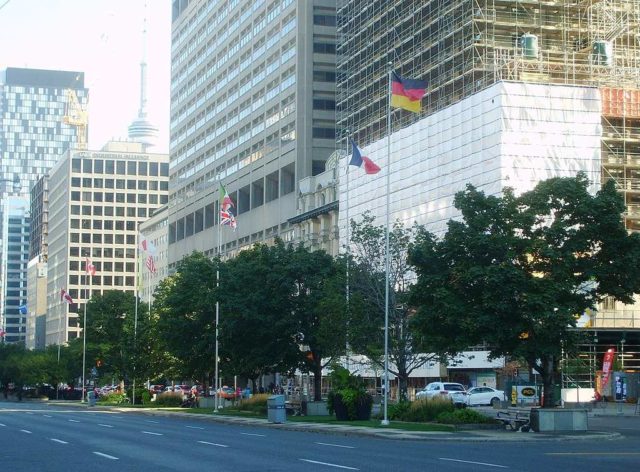
G7 leaders say Putin has put himself on ‘wrong side of history’ by attacking Ukraine Group of Seven flags (FreshCorp619/WikiCommons)
This article was originally published by Radio Free Europe/Radio Liberty and is reprinted with permission.
The Group of Seven has called Russia’s invasion of Ukraine a “serious threat” to global order and says Russian President Vladimir Putin has put himself on the wrong side of history by launching war in Europe.
The G7 statement followed a virtual meeting of the group on February 24 as Russia’s military action met with outrage and condemnation around the world.
The G7 said that it was “ready to act” on potential disruptions of energy supplies and that it was ready to provide support with humanitarian assistance for the expected wave of refugees and displaced persons.
U.S. President Joe Biden, who plans to speak from the White House on the new conflict in Ukraine at 12:30 p.m. local time, took part in the meeting along with his counterparts from the other G7 countries — Britain, Canada, France, Germany, Italy, and Japan.
The European Union is also stepping up its response to Russia’s invasion of Ukraine. It will agree to further sanctions “that will impose massive and severe consequences on Russia for its action,” according to a draft copy of a statement from the European Council obtained byRFE/RL.
The statement, covering the conclusions of an EU summit, said the sanctions would be imposed in close coordination with partners and allies and it calls for a further sanctions package that will also cover Belarus.
The statement condemns the “unprovoked and unjustified military aggression against Ukraine” and says Russia’s military actions violate international law and undermine European and global security and stability.
“Russia bears full responsibility for this act of aggression and all the destruction and loss of life it will cause. It will be held accountable for its actions,” the statement said.
The 27-member bloc announced sanctions against senior Kremlin officials on February 23, including Defense Minister Sergei Shoigu. The additional sanctions are expected to be approved later on February 24.
EU foreign policy chief Josep Borrell said the new round of sanctions would be the “harshest” ever imposed by the EU, adding that there will be “both sectorial and individual” sanctions.
Earlier on February 24, the EU summoned the Russian ambassador to the European Union to convey its “strongest condemnation” of the attack on Ukraine, the bloc’s foreign policy service said in a statement.
Ambassador Vladimir Chizhov was condemned for the “unprovoked, unjustified invasion of Ukraine by armed forces of the Russian Federation” and told to convey to Moscow Brussels’s demand for an immediate end to military operations, the statement said.




